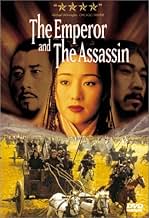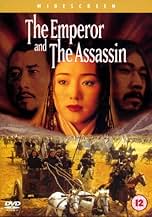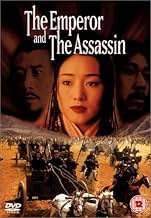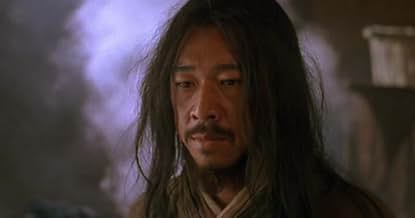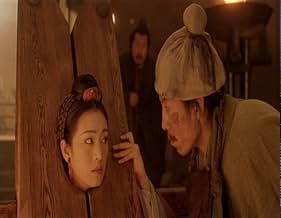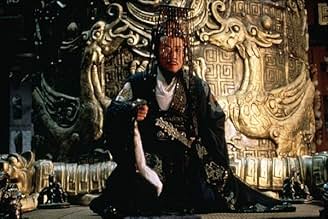NOTE IMDb
7,2/10
6,6 k
MA NOTE
Dans la Chine pré-unifiée, le roi de Qin envoie sa concubine dans un royaume rival afin de produire un assassin pour un complot politique, mais à mesure que la cruauté du roi augmente, sa lo... Tout lireDans la Chine pré-unifiée, le roi de Qin envoie sa concubine dans un royaume rival afin de produire un assassin pour un complot politique, mais à mesure que la cruauté du roi augmente, sa loyauté vacille.Dans la Chine pré-unifiée, le roi de Qin envoie sa concubine dans un royaume rival afin de produire un assassin pour un complot politique, mais à mesure que la cruauté du roi augmente, sa loyauté vacille.
- Réalisation
- Scénario
- Casting principal
- Récompenses
- 7 victoires et 11 nominations au total
Avis à la une
10oaksong
I've read some grumbles about the court scenes. These people betray their ignorance. This production went to simply amazing lengths to recreate all aspects of the period in which the story occurred. Courtly manners are something few people outside the court ever see. While the acting may appear highly stylized, it is, in fact, as close a replication as possible of the behavior of individuals in their particular stations as the director could create. The actor's facial expressions are a marvel, particularly the duplicitous Marquis Changxin and the King's mother.
There are, of course, reflections of both Greek and Shakespearian tragedy in the relationship between the king, his parents and his love. The juxtaposition of the king transforming from good to bad and the assassin from bad to good provides much food for thought on the evolution of an individual's nature. This movie would provide much to ponder in a college course on the humanities.
At the same time, it almost rushes along, even in the slowest scenes heading towards an inexorable denouement. One suspects the involvement of large portions of the troop movements, which were quite awesome. It makes The Lord of the Rings battle scenes pale by comparison. Few directors have the ability to literally field thousands of humans on the field of battle just for art's sake. I recall one scene in which at least 30,000 troops can be seen moving across a huge plain. The logistics for such a shot would have been staggering.
I could go on... but simply, I can't recommend this film highly enough.
There are, of course, reflections of both Greek and Shakespearian tragedy in the relationship between the king, his parents and his love. The juxtaposition of the king transforming from good to bad and the assassin from bad to good provides much food for thought on the evolution of an individual's nature. This movie would provide much to ponder in a college course on the humanities.
At the same time, it almost rushes along, even in the slowest scenes heading towards an inexorable denouement. One suspects the involvement of large portions of the troop movements, which were quite awesome. It makes The Lord of the Rings battle scenes pale by comparison. Few directors have the ability to literally field thousands of humans on the field of battle just for art's sake. I recall one scene in which at least 30,000 troops can be seen moving across a huge plain. The logistics for such a shot would have been staggering.
I could go on... but simply, I can't recommend this film highly enough.
This three-hour Chinese epic, set in 220 B.C., may ultimately amount to a familiar theme of an Emperor's idealistic dream of peace through unification mutating into corrupted isolation, and there's nothing inherently challenging about the film, but it's a compelling narrative, crammed with intrigue and passion and betrayal and epic events told in vivid strokes. Even for those not drawn to such historical spectacles for their own sake, it's an astonishing feast for the eyes: the scene depicting the coup attempt of the Marquis is one of the most staggering evocations of physical space and grandeur in memory, and the battle scenes are memorable both in their scope and their immediacy. The title sums up the film's use of compelling contrasts - huge plainland vistas set against intimate horrors; the noblest of motives set against the most degraded; hope turning to dust. If you've never seen a three-hour Chinese epic, this wouldn't be a bad place to start.
After seeing dressed up action films, like the two mentioned above, Emperor and the Assassin was a godsend. This film was such a marvelous blend of action, intrigue, and personality, and I'm sure I'll see it again and again in years to come.
Some of the complaints about the movie have been the golden/brown tint and the quick, disorienting editing. However, I loved both of these qualities in the movie, though the editing did take some time to get used to. A great example of it, is when we're introduced to Jing Ke, the assassin. He is offered an assignment for five thousand, and we see a close up of his face as he demands ten thousand. The next shot shows him with sword drawn, in the house of his victims. That whole introduction to the assassin was marvelously edited, in my opinion. You have to realize that in order to fit the epic plot into just under three hours, a lot of tiny details needed to be cut out. The quick editing also makes the movie seem much shorter than it really is.
Someone said that the swordfighting in the movie (what little of it there was) seemed like high school drama, but I strongly disagree. Most of the action is captured in a few shots, making it seem much more realistic. In so many american films, we see a a flash of a dozen close ups, without getting a feel for what is even happening! Also, the constant use of slow motion in many movies gets so old. By having the fighting in this movie fast and furious, it is much more affecting.
I won't give away the ending, but it was really suspenseful and surprising. I had no idea what would happen (being unfamiliar with Chinese history helped), and was on the edge of my seat! So, to conclude, if you like sweeping historical epics, make sure to see this! I really like the films of Kurosawa, and saw some similarities here, so also if you like his movies, see this!!
Some of the complaints about the movie have been the golden/brown tint and the quick, disorienting editing. However, I loved both of these qualities in the movie, though the editing did take some time to get used to. A great example of it, is when we're introduced to Jing Ke, the assassin. He is offered an assignment for five thousand, and we see a close up of his face as he demands ten thousand. The next shot shows him with sword drawn, in the house of his victims. That whole introduction to the assassin was marvelously edited, in my opinion. You have to realize that in order to fit the epic plot into just under three hours, a lot of tiny details needed to be cut out. The quick editing also makes the movie seem much shorter than it really is.
Someone said that the swordfighting in the movie (what little of it there was) seemed like high school drama, but I strongly disagree. Most of the action is captured in a few shots, making it seem much more realistic. In so many american films, we see a a flash of a dozen close ups, without getting a feel for what is even happening! Also, the constant use of slow motion in many movies gets so old. By having the fighting in this movie fast and furious, it is much more affecting.
I won't give away the ending, but it was really suspenseful and surprising. I had no idea what would happen (being unfamiliar with Chinese history helped), and was on the edge of my seat! So, to conclude, if you like sweeping historical epics, make sure to see this! I really like the films of Kurosawa, and saw some similarities here, so also if you like his movies, see this!!
I will admit my ignorance of this film's existence, until I saw it advertised on a cable outlet. I was very impressed with the novelistic structure of the film. The film, which is in a language I do not understand, shone with intelligence and nuance for me. I think this speaks to the film's quality. It was visually stunning. The acting was visually entrancing. The Chinese theater traditions of movement, used to enhance the delivery of dialogue, is so compelling after watching Western film, where actors traditionally focus more heavily on the dialogue. The action in this film comes right at you, without a lot of explosions to get your attention. It is human action that is so affective here. The added advantage that the film taught me history about one of the world's greatest tourist attractions, the funereal clay army of China's First Qin Emporer, was very impressive. It seemed to give the film an international relevance beyond the film's great ethical themes. This is a film I can comfortably recommend to a wide variety of friends and acquaintances.
10Anth-8
After watching the movie a few times, I found so many subtle touches and emotions within the dialogue. Jing Ke, the Assassin has become one of favorite movie characters of all time. This fine Chinese actor says more with his eyes and his economy of words and movements then any big screen American actor today. Qin, the Emperor, is brilliant as he leads the audience to believe the kindness in his heart, only to unleash the most cruel acts upon the people around him. The promises he makes with incredible passion and shattered with an evil fist. Gong Li, as in just about every movie I've ever seen her in, is simply fantastic. Her screen dominance is so graceful and emotionally charged.
In case you couldn't tell, I loved this movie.
In case you couldn't tell, I loved this movie.
Le saviez-vous
- AnecdotesThe Xianyang palace was reconstructed in its entirety in the city of Dongyang in Zhenjiang province. Much of the film, including the final scene, was shot there. It is now being preserved as a theme park drawing large numbers of tourists. In addition, the capital cities of the other kingdoms featured in the film, Yan Zhao and Han, were constructed as several sights across China. All have been meticulously built to scale with special attention paid to their historical accuracy.
- Versions alternativesFirst cut was deemed regime-critic by chinese censors and therefore rejected. Approximately 30 minutes were cut to make a more regime-friendly version.
Meilleurs choix
Connectez-vous pour évaluer et suivre la liste de favoris afin de recevoir des recommandations personnalisées
Détails
- Date de sortie
- Pays d’origine
- Sites officiels
- Langue
- Aussi connu sous le nom de
- The Emperor and the Assassin
- Sociétés de production
- Voir plus de crédits d'entreprise sur IMDbPro
Box-office
- Budget
- 15 000 000 $US (estimé)
- Montant brut aux États-Unis et au Canada
- 1 267 239 $US
- Week-end de sortie aux États-Unis et au Canada
- 47 295 $US
- 19 déc. 1999
- Montant brut mondial
- 1 267 239 $US
- Durée2 heures 42 minutes
- Couleur
- Mixage
- Rapport de forme
- 1.85 : 1
Contribuer à cette page
Suggérer une modification ou ajouter du contenu manquant

Lacune principale
By what name was L'empereur et l'assassin (1998) officially released in India in English?
Répondre

